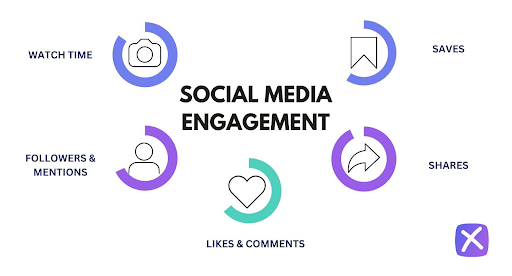In the hyper-dynamic landscape of digital marketing, followers and likes have been traditionally perceived as the image of popularity. In 2025, however, the actual scale of influence has changed to something far more intricate social media engagement. Businesses, influencers, and brands are finding it increasingly important that it is no longer sufficient to have large numbers, but rather how audiences interact and respond, and take action. Trust, authenticity, and long-term impact are all characterized by engagement, and thus, it is the most useful metric in the modern competitive online environment.
The Shift from Vanity Metrics to Real Value
The number of followers and likes was the most popular measure of social media success over the years. Yet these vanity measures are deceptive. Bots, fake followers, and passive audiences may boost numbers that can bring no actual business value.
In stark contrast, engagement, which is measured by comments, shares, direct messages, saves, and meaningful conversations, demonstrates real interest. A performer or brand with less following and more engagement can many times be stronger than one who has millions of inactive followers. It is this development that led companies to invest in a growth platform focused on real, measurable results and quantifiable returns, as opposed to pursuing bigger figures.
Why Engagement Matters More in 2025
1. Genuineness Drives Influence.
Today the consumers are very choosy in the kind of people they follow and trust. They want honesty and not polished excellence. It is an indication of a real connection when audiences participate by asking questions, providing feedback, or sharing content. True interest generates attachment, and that is much more potent than superficial concern.
2. Algorithms Reward Interaction.
The personalized recommendations of social media in 2025 are focused on the content that can result in meaningful interactions. More vivid posts receive amplified reach that guarantees more people see and interact with the posts. This turns out to be the fuel that boosts organic visibility, which assists the brands in growing without fully having to rely on paid ads.
3. Conversions are the result of Engagement.
Conversions occur when audiences feel connected, whether it is registering for a webinar, making a purchase, or becoming part of a community. The involvement is a mediator between knowledge and practice. Any campaigns that are most aesthetically appealing fail without it.
4. Data-Driven Proof of Impact
Engagement metrics would give a business measurable insights. They do not use vanity numbers to state what resonates with audiences as opposed to vanity numbers. Comments, reactions, and the use of click-through rates will show what the audience likes, and brands will be able to refine strategies to produce the best effect.
Social Media Engagement and Business Growth
In 2025, brands do not just wish to be perceived, but also wish to develop in a sustainable manner. Engagement could be directly turned into business outcomes, comprising lead generation, customer retention, and long-term loyalty. This is why increasingly companies are moving to a growth platform that is more research-intensive in terms of tangible, quantifiable results. Interaction, optimization of strategies, and direct ROI. These platforms measure the interaction and focus it on digital marketing.
Key Strategies to Boost Social Media Engagement
User-Generated Content (UGC): The follower shares on a brand, and the follower gathers trust. UGC campaigns are very interactive since they make the audience the center of attention and make them feel appreciated and listened to.
Telling Stories that Work: Stories have more of an influence on people than promotions. The brands sharing information behind the scenes, customer experience, or founder stories create more engagement. Emotional storytelling triggers remarks, repins, and long-term loyalty.
Consistency in Community Building: Societies exist on communication. Sense of belonging is developed in brands through responsiveness in the form of comments, concern, and discussion. Community is an influential instrument that will have a long-term effect and engagement.
Case in Point: Engagement vs. Popularity
Consider two creators:
- Creator A has 500,000 followers but receives minimal comments and shares.
- Creator B has 50,000 followers but a highly engaged community that interacts daily.
The campaigns created by a brand when collaborating with Creator B produce more leads and sales, regardless of the smaller following. This example demonstrates why, in 2025, the actual currency of influence will not be a number of followers but engagement.
The Future of Social Media Influence
Going forward, social media will keep on changing; however, there will always be one thing unchanging: engagement is the hallmark of influence. Companies and artists that, instead of pursuing more inflated figures, focus on quality relationships, will flourish. With engagement as their key point of focus, they expand their online base, not only that, but also achieve quantifiable results in the form of conversions, alliances, and brand loyalty.
The best bet that businesses can make in 2025 is to identify with a growth platform that is aimed at achieving real, measurable outcomes where each interaction matters. The involvement is not a luxury anymore; it is the keystone to online success.
Final Thoughts
The quality of social media influence in 2025 will be quality and not quantity. Participation is an expression of credibility, authenticity, and real influence. Some followers might still be attention-catching, but no longer a sure sign of influence or business success. The important thing is the interaction, response, and connection of the audience.
To the brands, creators, and marketers, the way to a long-term impact digitally is obvious. Focus on interaction, authenticity, and the strategies that will provide actual, quantifiable results. Engagement is no longer the measure of influence in this new era; it is the pulse of social media success.



